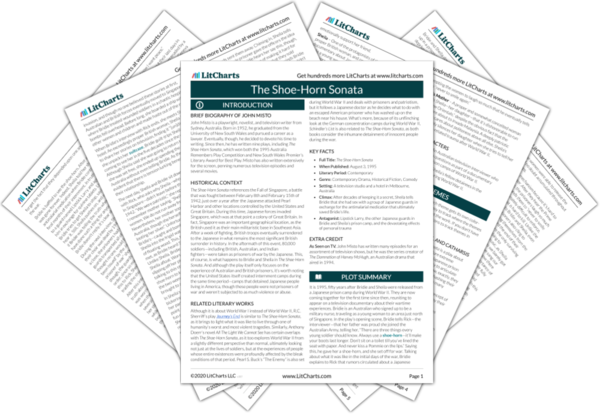Survival, Resilience, and Catharsis
John Misto’s The Shoe-Horn Sonata is a play about what it takes for a person to endure extreme emotional hardship. Survivors of Japanese prison camps during World War II, Bridie and Sheila try to articulate what it was like to live as prisoners of war and how, exactly, they sustained themselves during their internment. Rehashing their experiences for a television documentary about the many military nurses who were captured by the Japanese government, they tell…
read analysis of Survival, Resilience, and CatharsisPride and Patriotism
In The Shoe-Horn Sonata, John Misto scrutinizes the effect pride has on people in times of distress. On the one hand, Sheila’s unflinching patriotism helps her get through the war, since her feelings of British superiority actually enable her to embody a stubborn kind of wherewithal, one linked to her ego. On the other hand, though, her conceited nationalism also becomes a point of tension in her relationship with Bridie, who bristles…
read analysis of Pride and PatriotismFriendship, Sacrifice, and Resentment
In The Shoe-Horn Sonata, Misto examines the complicated nature of friendship, proving that even the closest relationships are often full of tension. Bridie and Sheila’s bond demonstrates this, as they form a close relationship in a Japanese prison camp, an environment that only emphasizes the many ways in which friendship sometimes demands personal sacrifice. They each go out of their way to keep one another alive, and though they do this because they…
read analysis of Friendship, Sacrifice, and Resentment
Trauma and Repression
The Shoe-Horn Sonata brings to light the toxic effects of holding onto trauma. After five decades of trying to forget about the terrible violence of the Japanese prison camps, Sheila is averse to the mere idea of talking about what she went through. Believing that “when something hurts you run away,” she has spent the last fifty years avoiding Bridie because she knows her friend will only remind her of the terrible experiences she was…
read analysis of Trauma and Repression






